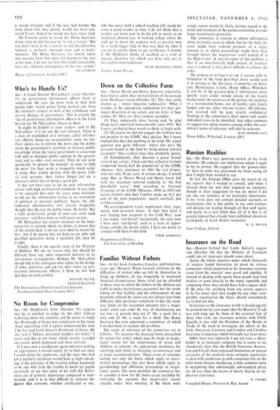Who's to Handle Us?
SIR.—! found Donald McLachlan's article (October 21) on government information officers hard to understand. He says the press wish to deal with people who 'watch policy being worked out, have the minister's respect as well as his confidence and survive changes of government.' This is exactly the role of professional information officers in the Civil Service yet Mr McLachlan objects to them.
It might be helpful to your readers—and to Mr McLachlan—if I set out the real situation. There is
class of established civil servants called informa- tion officers. Some are ex-journalists, some are not. Their duties are to inform the press and the public about the government's activities, to increase public knowledge about the topics government is concerned with and to interpret public opinion to the govern- ment and to other civil servants. They do not exist specifically `to protect the minister' or even `to help the press' for their work is frequently much wider in scope than simply dealing with the press. Like all civil servants, their future hinges not on a minister's whim but on doing a good job.
It has not been easy to set up such information service with high professional standards. It was only to be expected that over the years some ministers wculd see the information service as an instrument of political or personal publicity. Again, the old- fashioned administrative civil servant frequently thought that the less the public knew, the better. But fully professional group of men can resist such pressures—and have done so with great success.
Mr McLachlan has certain strictures on the Insti- tution for its attitude which, he thinks, is almost that of the closed shop. I am not sure what he means by this: but if he means that we hope to see able and qualified specialists doing a specialist job, then he is right.
Finally, there is the specific issue of the Ministry of Defence. We see no reason why this should be different from any other important ministry in its information arrangements. Perhaps Mr McLachlan should talk to his colleagues who report on the doings f other ministries and ask for their views on pro- fessional information officers. I think be will find that they are well satisfied.
WILLIAM MCCALL
General Secretary
The Institution of Professional Civil Servants, Northumberland Street, London WC2


































 Previous page
Previous page